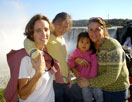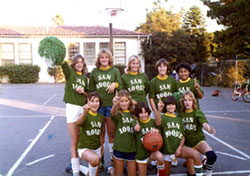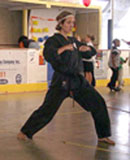 For some people, working out is a way to stay fit. For others, it’s a way to have fun. For Title Nine customer Lisa Schneider, it’s a way of life. As a working mom, finding time to stay fit can be a challenge, but Lisa makes it seem effortless. Maybe that’s because she’s been doing it for as long as she can remember. A quick count reveals at least 11 sports that Lisa has avidly pursued at one point or another since childhood, and that number doesn’t even include the athletic activities—like skiing, hiking, and biking—that she does with her family on the weekends. So it’s no surprise that working out is a significant part of Lisa’s daily routine.
For some people, working out is a way to stay fit. For others, it’s a way to have fun. For Title Nine customer Lisa Schneider, it’s a way of life. As a working mom, finding time to stay fit can be a challenge, but Lisa makes it seem effortless. Maybe that’s because she’s been doing it for as long as she can remember. A quick count reveals at least 11 sports that Lisa has avidly pursued at one point or another since childhood, and that number doesn’t even include the athletic activities—like skiing, hiking, and biking—that she does with her family on the weekends. So it’s no surprise that working out is a significant part of Lisa’s daily routine.
It’s a routine that typically starts at 6:15am with a quick shower before the kids wake up. As a mother of two young girls, JiJi (nine) and KaiMei (two), Lisa’s mornings revolve around getting the kids dressed, fed, and ready for the day—a task she happily shares with her partner Mary.
Breaking Barriers—On and Off the Field
After dropping off JiJi at school or KaiMei at daycare, it’s off to Cornell University. In the 90s, Lisa earned her Masters and PhD in Sociology from Cornell. Now she works in the university’s College of Engineering as Director of Engineering Learning Initiatives, managing programs that enhance the learning environment in the college.
An engineering school may seem like an unlikely place for a PhD in sociology to end up, but it’s not as far a leap as you might think. “My dissertation research was on looking at pathways to nontraditional careers for women,” Lisa says, “and looking at women who have played sports in particular. Does the confidence and experience gained by, in many cases, breaking gender barriers and expectations correlate with a greater likelihood of going into careers that are nontraditional for women?” In her current role, “there’s a lot of emphasis on attracting and retaining nontraditional students—in engineering that includes women. Nationally, women comprise less than 20 percent of all engineering students.”
So are female athletes more likely to follow nontraditional career paths? If they were all like Lisa, the answer would be a resounding yes. A talented and determined athlete, Lisa has been bending, if not breaking,  gender barriers in sports since she was a young girl. She recalls being barred from playing organized youth football—her favorite sport at the tender age of nine—but often beating the boys on the playground at recess. Even Little League was off limits to girls back then, but Lisa never settled for being stranded in the stands. “I was someone who really pushed those barriers,” Lisa says. “I think that experience contributed to my commitment to breaking barriers in other areas of life—working to remove barriers for myself, women in general, and other minorities.” Today, Lisa runs programs that help women and other nontraditional students get a foothold in the male dominated world of engineering.
gender barriers in sports since she was a young girl. She recalls being barred from playing organized youth football—her favorite sport at the tender age of nine—but often beating the boys on the playground at recess. Even Little League was off limits to girls back then, but Lisa never settled for being stranded in the stands. “I was someone who really pushed those barriers,” Lisa says. “I think that experience contributed to my commitment to breaking barriers in other areas of life—working to remove barriers for myself, women in general, and other minorities.” Today, Lisa runs programs that help women and other nontraditional students get a foothold in the male dominated world of engineering.
Taking the Work Out of Working Out
 For Lisa, working out is as natural and necessary as breathing. It’s as fluid and adaptable as well. In her younger years, Lisa’s athletic career included scads of team sports, from starring on her high school basketball team to playing world-class Ultimate Frisbee in college and beyond. But these days team sports would cut into valuable family time, so team sports are out and lunchtime workouts are in. What those workouts entail depends largely on the weather. In the spring and summer, Lisa usually does a 30 to 40-minute trail run three or four times a week. Rainy days will find her in the gym, where she’ll spend about 30 minutes on the elliptical trainer followed by sit-ups and some work with free weights.
For Lisa, working out is as natural and necessary as breathing. It’s as fluid and adaptable as well. In her younger years, Lisa’s athletic career included scads of team sports, from starring on her high school basketball team to playing world-class Ultimate Frisbee in college and beyond. But these days team sports would cut into valuable family time, so team sports are out and lunchtime workouts are in. What those workouts entail depends largely on the weather. In the spring and summer, Lisa usually does a 30 to 40-minute trail run three or four times a week. Rainy days will find her in the gym, where she’ll spend about 30 minutes on the elliptical trainer followed by sit-ups and some work with free weights.
During the long upstate New York winters, Lisa spends more time in the gym and takes a yoga class once a week. In an impressive display of athletic flexibility, she also avails herself of a university perk—free skating time at the hockey team’s ice rink. A native Californian, Lisa has adapted her longtime love of rollerblading to suit her snowy surroundings in the northeast.
Getting Grounded—At Home and At the Dojo
Most nights Lisa gets home between 5:00pm and 6:00pm, draws a bath for the girls, and gets dinner started. The family sits down to eat around 7:00pm and then enjoys some family fun time until 8:30pm or so, when it’s time to get the girls in bed.
Lisa’s nightlife takes an interesting turn on Tuesdays when she practices the one sport she just couldn’t live without—karate. At 5 feet 5½ inches tall and 122 pounds, Lisa may not look like much to reckon with, but you’d do well not to mess with her. She started studying karate 12 years ago when she was a 28-year-old grad student. “It was a lifesaver when I was writing my dissertation and in the throes of that,” Lisa says. “I started training and I just loved it. Back then I went every night during the week.”  Now a second-degree black belt, Lisa trains only on Tuesday nights when she takes an all ranks and ages karate class with her older daughter JiJi. It’s some special mother-daughter time when Lisa gets to share her passion with her girl.
Now a second-degree black belt, Lisa trains only on Tuesday nights when she takes an all ranks and ages karate class with her older daughter JiJi. It’s some special mother-daughter time when Lisa gets to share her passion with her girl.
After their class together, JiJi has dinner with a classmate while Lisa takes a black belt class. Earning her black belt ranks among Lisa’s proudest accomplishments. It took her about five years, which was fast for her karate school (or dojo). For Lisa, karate isn’t about competition. It’s about personal development. And it shows. It’s evident in the way she tackles the rigors of everyday life—with humility, grace, and quiet resolve. You go girl!

So the children only get about 1 hour of focused time with Mom each day because Mom works and works out and puts one child in daycare. This just angers me. Poor, poor children. They need a mom! She’s not “doing it all,” and in fact the most important thing she should be doing she’s not doing at all…being her kids’ mom! This story is “typical” of today’s average woman and does not inspire me at all. It just angers me the sweet kids don’t have a mom.
woohoo – great to see Cornell on here! I was never in better shape than when I did the “late to class” run every morning up those Ithaca hills!
I liked this article as I am a female engineer and found this article to be relative to my life. However, I was hoping for some tips as to how Lisa pulls this off!
I love, love, love reading stories about active women! Very inspiring. Thank you, Title Nine, for posting them.
And, karate at Cornell? Not with Borthwick Sensei by any chance?
Hello,
Thanks to all for the nice and supportive comments!
It is Ithaca Karate Harmony with Nature School – Sensei Kathleen Garrity.
http://ithacakarate.com/index.html
Lis! The 15-minutes of fame! I know Lisa and she is all this and more…very inspired and very inspirational. I think that she is setting a great example for her daughters in being a strong, active woman who blows right past gender barriers. What a rockstar.
Lisa is inspirational! I am becoming an adoptive mother sometime this year and I was concerned about how I was going to balance all aspects of my life. Now I know it can be done! Thank you for showing that it is possible to be a gret mom, working professional, and an athlete all at the same time!
Hi,
I loved this story. It is always inspiring to hear how people aspire to make sacrifices to stay fit, but strive for balance.